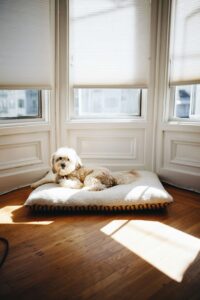Living in an apartment has its own unique set of advantages and challenges, especially when you decide to add a puppy to your home. While puppies bring joy, energy, and companionship, they can also present several challenges that apartment dwellers commonly face. From managing noise and potty training to dealing with limited space, this detailed guide will help you navigate the complexities of apartment life with your new furry friend.

Understanding the Challenges of Apartment Life with Puppies
Before jumping into solutions, let’s quickly identify some of the most common challenges puppy owners encounter in apartments:
-
Noise complaints due to barking or whining
-
Difficulty with potty training without immediate outdoor access
-
Limited space for play, exercise, and relaxation
-
Ensuring your puppy gets adequate socialization
-
Managing separation anxiety and destructive behaviors
Fortunately, each of these challenges can be addressed with thoughtful strategies and proactive planning.
1. Managing Noise Complaints: Keeping Your Puppy Quiet
Noise complaints are a top concern for apartment dwellers. Puppies naturally express themselves through barking, whining, and playful growling. However, persistent noise can lead to strained relationships with neighbors.
Solutions:
-
Training Commands: Teach your puppy the “quiet” command early on. Reward silence with praise or treats.
-
Distraction and Stimulation: Provide interactive toys and puzzles to keep your puppy mentally stimulated, reducing boredom-induced barking.
-
White Noise or Calming Sounds: Use calming background music or white noise machines to mask external sounds that trigger barking.
-
Positive Reinforcement: Always reward quiet, calm behaviors, reinforcing good habits over time.
2. Potty Training Problems: Solutions for Limited Outdoor Access
Potty training in an apartment can be more challenging because you can’t simply open a door to a yard.
Solutions:
-
Establish a Schedule: Consistency is key. Take your puppy outside at regular intervals—immediately upon waking, after meals, after play, and before bedtime.
-
Indoor Potty Solutions: Consider training pads, litter boxes, or grass potty patches. Choose a consistent indoor spot to create familiarity.
-
Reward-Based Training: Immediately reward your puppy when they use their designated potty spot, indoors or outdoors.
-
Patience and Positive Reinforcement: Accidents will happen—clean them calmly and never punish your puppy, as this can create anxiety around potty training.
3. Limited Space: Maximizing Comfort and Play Area
Apartment space is often limited, but puppies require room for play, rest, and exploration.
Solutions:
-
Efficient Space Planning: Use vertical storage for puppy supplies to free up floor space.
-
Dedicated Puppy Zones: Set up a specific area with a comfortable bed, crate, or playpen to create structure and security for your puppy.
-
Regular Exercise: Frequent short walks, play sessions, or visits to local dog parks provide the physical activity your puppy needs.
-
Interactive Toys: Rotate toys weekly to maintain interest without cluttering your space.
4. Socialization Challenges: Ensuring Adequate Puppy Interaction
Apartment puppies might face fewer opportunities to socialize compared to those with yards or neighborhoods with plenty of other dogs nearby.
Solutions:
-
Scheduled Playdates: Arrange puppy playdates with neighbors or friends who have friendly, vaccinated pets.
-
Puppy Classes: Enroll in obedience or socialization classes specifically designed for young dogs. These classes foster social skills in a controlled, safe environment.
-
Regular Outings: Walk your puppy in different locations or visit pet-friendly stores, cafes, or parks to expose them to various environments and people.
-
Positive Exposure: Gently introduce your puppy to neighbors, building staff, and visitors, ensuring these experiences remain positive and stress-free.
5. Separation Anxiety and Destructive Behaviors: Addressing Loneliness
Apartment puppies may experience separation anxiety, especially when left alone during your workday, potentially leading to destructive behaviors.
Solutions:
-
Gradual Separation Training: Slowly increase the time your puppy spends alone, starting from just a few minutes and gradually extending the duration.
-
Comforting Environment: Provide comforting items like blankets or toys with your scent to reduce anxiety.
-
Crate Training: A crate can provide a safe and comforting space, helping puppies feel secure when alone.
-
Professional Assistance: Consider hiring a dog walker or puppy sitter to visit your pet during long days, providing comfort and companionship.
Additional Tips for Harmonious Apartment Life with Puppies
-
Communicate with Your Neighbors: Introduce your puppy to neighbors, and inform them that you’re working on training. Open communication can ease potential tensions.
-
Keep Essential Cleaning Supplies: Invest in pet-safe cleaning supplies for inevitable accidents, ensuring odors and stains are effectively managed.
-
Regular Veterinary Visits: Maintain your puppy’s health through regular check-ups, vaccinations, and preventive care, as healthy puppies adapt better to apartment life.
Final Thoughts: Enjoying Apartment Life with Your Puppy
While apartment living with a puppy does pose unique challenges, it can also be an immensely rewarding experience filled with love and companionship. By proactively addressing these common issues through consistent training, patience, and creativity, you can create a nurturing environment for your puppy to grow into a well-behaved and happy adult dog.
With proper planning and a bit of dedication, your apartment puppy will thrive—and you’ll both enjoy a harmonious living arrangement, no matter how small the space may be.

